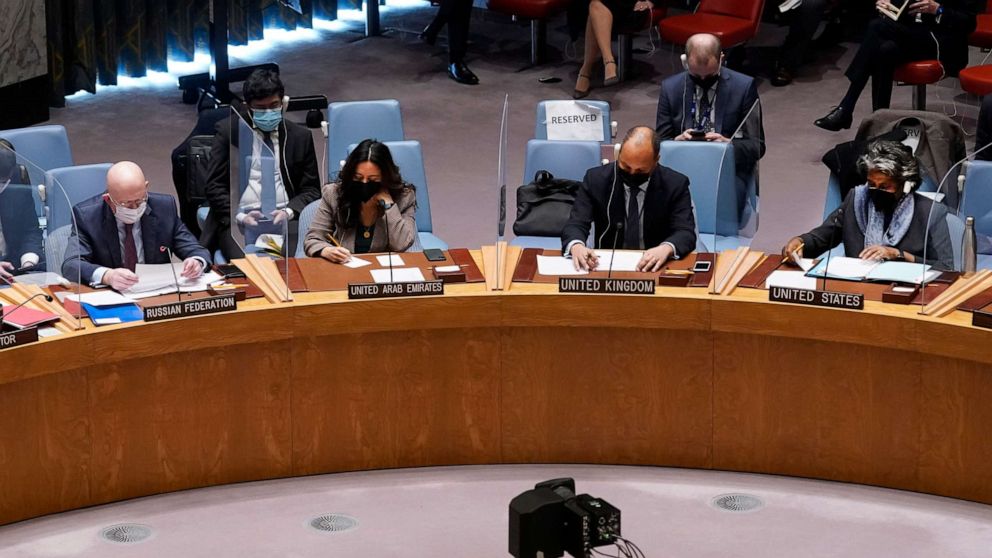After months of tensions over Russia‘s massive troop buildup on Ukraine‘s borders, the United Nations Security Council met Monday to discuss the situation for the first time — adjourning after over two hours of open debate.
The meeting didn’t yield any action or even a joint statement, but ambassadors from the U.S. and Russia sparred in dueling remarks, trading blame for escalating the crisis.
Russian leader Vladimir Putin has amassed over 100,000 troops and heavy equipment and weaponry on three sides of Ukraine, including in Russian-annexed Crimea and in Belarus, Kyiv’s northern neighbor and a close Kremlin ally.
At first, Russia, backed by China, tried to block the session from moving forward by calling a vote among Security Council’s 15 member states. Russia and China opposed it, three countries abstained, but ten voted to move ahead with it.
“You heard from our Russian colleagues that we’re calling for this meeting to make you all feel uncomfortable. Imagine how uncomfortable you would be if you had 100,000 troops sitting on your border in the way that these troops are sitting on the border with Ukraine,” said U.S. ambassador to the U.N. Linda Thomas-Greenfield. “This is not about antics. It’s not about rhetoric. It’s not about ‘U.S. and Russia.’ What this is about is the peace and security of one of our member states.”
In her remarks, she accused Russia of “the largest — hear me clearly — mobilization of troops in Europe in decades” and threatening military action should its concerns about Ukraine joining NATO and NATO’s troop deployments in Eastern European member states not be addressed.
“If Russia further invades Ukraine, none of us will be able to say we didn’t see it coming, and the consequences will be horrific,” she added.
But Russia’s envoy again denied that the Kremlin is planning to attack its neighbor, a former Soviet state and now a growing democracy — telling the Security Council there is “no proof confirming such a serious accusation whatsoever,” defending troop movements within Russia’s borders as a domestic issue, and then denying there are 100,000 as U.S. and other Western officials have said.
“They themselves are whipping up tensions and rhetoric and are provoking escalation,” Russian Ambassador Vassily Nebenzia said of the U.S. and its NATO allies. “The discussions about a threat of war is provocative in and of itself. You are almost calling for this. You want it to happen. You’re waiting for it to happen.”
Thomas-Greenfield requested to speak again to respond, saying, “I cannot let the false equivalency go unchecked, so I feel I must respond. … The threats of aggression on the border of Ukraine — yes on its border — is provocative. Our recognition of the facts on the ground is not provocative.”
Ukraine — which is not a member of the Security Council, but was invited to participate — urged Russia to respect its “sovereign right” to choose which countries it partners with.
“Ukraine will not bow to threats aimed at weakening Ukraine, undermining its economic and financial stability, and inciting public frustration. This will not happen. And the Kremlin must remember that Ukraine is ready to defend itself,” Ukrainian Ambassador Sergiy Kyslytsya told the council.
In a sign of their increasing alignment, China was the only country to back Russia’s effort to squash the public meeting. Its ambassador Zhang Jun said they oppose “microphone diplomacy of public confrontation” and believed the open discussion of the issue would add “fuel to the tension.”
While the session didn’t yield any results, it marks the start of another week of diplomacy between Russia and the U.S. and its allies over Ukraine.
“Russia heard clearly a united position from the vast majority of the council, and I hope that that will lead to a diplomatic solution,” Thomas-Greenfield, a member of President Joe Biden’s Cabinet, told reporters after the meeting.
Biden himself hailed the meeting as “a critical step in rallying the world to speak out in one voice: rejecting the use of force, calling for military de-escalation, supporting diplomacy as the best path forward.”
On Tuesday, Secretary of State Antony Blinken will speak with Russian Foreign Minister Sergei Lavrov, the State Department and Russian Foreign Ministry confirmed Monday — the first conversation after the U.S. responding in writing last week to Russia’s demands about Ukraine and NATO.
British Prime Minister Boris Johnson is expected to speak to Putin this week, days after the U.K. said it could deploy troops to protect NATO allies if Russia invaded Ukraine. Biden announced a similar position last week, putting 8,500 U.S. troops on “heightened alert” and adding Friday he could do so in the “near” future.
In a potential positive sign for diplomacy, Russia said some of its forces had pulled back from the border areas after a “preparedness check,” according to the Russian Armed Forces’ Southern Military District.
But it’s not yet clear if the U.S. had confirmed any troops were withdrawn from the border region, and Thomas-Greenfield warned the U.S. has evidence Russia intends to expand its presence in Belarus to more than 30,000 troops — putting them less than two hours north of Kyiv. Those deployments include short-range ballistic missiles, special forces, and anti-aircraft batteries, she added — all of which Russia and Belarus have said are for military exercises.
ABC News’s Zoha Qamar contributed to this report.

